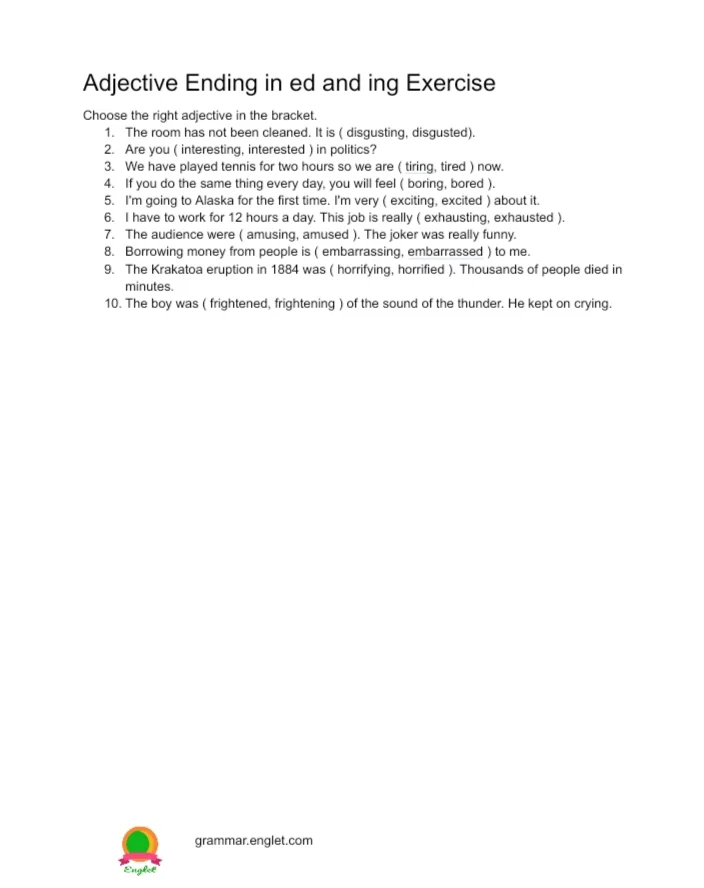The Difference between Adjectives Ending in Ing and Ed
Adjectives ending in -ing and -ed have different meaning. Ing adjectives cause us to have the feeling of something whereas ed adjectives are what we feel.
These two types of adjectives are also known as participial adjectives. The verb ending in ing is called present participle. And, the verbs ending in ed, including all the verbs III, are called past participle. Both of them can function as adjectives and we call them participial adjectives.
Adjectives Ending in Ing and Ed Examples
Let’s see the following examples:
Boring versus Bored
Interesting versus Interested
Surprising versus Surprised
Disappointing versus Disappointed
Tiring versus Tired
Conclusion
- Adjectives ending in ing cause us to have the feeling of something.
- Adjectives ending in ed is the feeling we have. The adjectives that we feel.
| Ing Adjectives | Ed Adjectives |
| fascinating exciting amusing amazing astonishing shocking disgusting embarrassing confusing horrifying terrifying frightening depressing worrying annoying exhausting satisfying |
fascinated excited amused amazed astonished shocked disgusted embarrassed confused horrified horrified frightened depressed worried annoyed exhausted satisfied |
Adjective Ending in ed and ing Exercise
Exercise I | Adjective Ending in ed and ing Exercise
- The room has not been cleaned. It is ( disgusting, disgusted).
- Are you ( interesting, interested ) in politics?
- We have played tennis for two hours so we are ( tiring, tired ) now.
- If you do the same thing every day, you will feel ( boring, bored ).
- I’m going to Alaska for the first time. I’m very ( exciting, excited ) about it.
- I have to work for 12 hours a day. This job is really ( exhausting, exhausted ).
- The audience were ( amusing, amused ). The joker was really funny.
- Borrowing money from people is ( embarrassing, embarrassed ) to me.
- The Krakatoa eruption in 1884 was ( horrifying, horrified ). Thousands of people died in minutes.
- The boy was ( frightened, frightening ) of the sound of the thunder. He kept on crying.
Exercise II | Adjective Ending in ed and ing Exercise
Complete each sentence with correct adjective provided.
| disgusting boring terrifying interested interesting bored boring |
- His speech was ___________ . Nobody paid attention to it.
- The picture of a ghost is __________. Everyone in the room closed their eyes.
- My little sister is not ___________ in music but she loves drawing pictures.
- You look __________ Let’s go to the party.
- Football is not __________ to me. Instead, I often play table tennis.
- The toilet is so ___________ . It seems nobody ever cleans it.
Answer
Exercise I
- The room has not been cleaned. It is disgusting.
- Are you interested in politics?
- We have played tennis for two hours so we are tired now.
- If you do the same thing every day, you will feel bored.
- I’m going to Alaska for the first time. I’m very excited about it.
- I have to work for 12 hours a day. This job is really exhausting.
- The audience were amused. The joker was really funny.
- Borrowing money from people is embarrassing to me.
- The Krakatoa eruption in 1884 was horrifying. Thousands of people died in minutes.
- The boy was frightened of the sound of the thunder. He kept on crying.
Exercise II
- His speech was boring. Nobody paid attention to it.
- The picture of a ghost is terrifying. Everyone in the room closed their eyes.
- My little sister is not interested in music but she loves drawing pictures.
- You look bored . Let’s go to the party.
- Football is not interesting to me. Instead, I often play table tennis.
- The toilet is so disgusting. It seems nobody ever cleans it.
Download the exercise in Google Drive.
Adjective Ending in ed and ing Worksheet
Get this exercise to improve your knowledge about ing adjectives and ed adjectives.
Other Exercises
Save your time by having our ebook Buy 119+ Situations by 16 Tenses here.
or you can also have the paperback book here:




Leave a Reply
You must be logged in to post a comment.